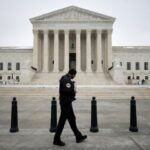

The Supreme Court on Friday agreed to review a pair of consequential decisions that struck down the Federal Communication Commission‘s Universal Service Fund, a $8 billion annual program supporting phone and internet access in schools, libraries, and rural areas.
A decision in the case, for which arguments are expected next year, could reshape the boundaries of federal regulatory authority and reignite debates over the nondelegation doctrine, which limits Congress’s ability to transfer legislative power to federal agencies.
One of the cases granted, Consumers’ Research v. FCC, was previously decided in a 9-7 ruling by the full 5th U.S. Circuit Court of Appeals that found the USF’s funding mechanism unconstitutional. The legal question more specifically focuses on the FCC’s authority to collect fees from telecommunications providers, who pass the cost to consumers to fund the program.
The 5th Circuit, one of the most conservative in the nation, determined that Congress granted the FCC excessive power and that the agency further delegated authority to a private entity, violating constitutional limits.
The cases granted Friday coincide with a broader trend of reviewing alleged federal regulatory overreach, as the previous high court term saw the justices curb federal regulatory power by overturning Chevron deference, restricting administrative adjudication in SEC v. Jarkesy, and reinforcing the major questions doctrine.
A conservative challenge to federal oversight
Consumers’ Research, a conservative advocacy group campaigning against “woke” corporate frameworks such as environmental, social, and governance principles, argued that the FCC’s funding structure unfairly burdens consumers and exceeds the scope of its congressional mandate.
The Supreme Court previously declined to hear similar appeals by Consumers’ Research after federal appellate courts upheld the program in a case known as SHLB Coalition v. Consumers’ Research. However, the 5th Circuit’s en banc decision presented a split that warranted the justices’ attention.
The Biden administration swiftly appealed the ruling, arguing that dismantling the USF would disrupt critical services relied upon by millions of people in the United States.
The nondelegation doctrine returns
The Supreme Court has not struck down a federal law on nondelegation grounds since 1935, but recent conservative-majority rulings suggest a willingness to revisit the doctrine. Republican-appointed Justices Neil Gorsuch and Clarence Thomas have been vocal about their interest in curbing what they see as an unchecked delegation of power to administrative agencies. Other members appointed by Republican presidents, including Chief Justice John Roberts and Justice Amy Coney Barrett, have also expressed concerns about the constitutional boundaries of agency authority.
Legal experts believe the case could serve as a significant vehicle for the court to clarify or expand the nondelegation doctrine.
Corbin Barthold, internet policy counsel at TechFreedom, predicted last month that the justices could be interested in taking on the case, writing on his Substack page: “A majority of the sitting justices have expressed interest in ending that dry spell, and they are about to get their chance.”
Possible effect on rural and underserved communities
The outcome of the case could have far-reaching implications for communities that depend on the Universal Service Fund. Rural areas, where broadband access remains sparse, are among the largest beneficiaries of the program. Schools and libraries that rely on the fund to provide internet access for students could also face significant setbacks if the funding structure is dismantled.
Supporters of the USF argue that its elimination would create a digital divide, disproportionately harming low-income and rural communities. However, critics contend that the funding method is regressive, effectively taxing consumers to subsidize services in a manner that lacks transparency and accountability.
“American citizens and consumers alike deserve basic accountability in government and in the marketplace,” Will Hild, executive director of Consumers’ Research, wrote in a statement Friday. “Americans currently are forced to pay a tax with every phone bill, set by unelected bureaucrats, at the recommendation by the same private corporation that receives the revenue.”
CLICK HERE TO READ MORE FROM THE WASHINGTON EXAMINER
The Supreme Court’s eventual ruling in this case will likely have ripple effects across the regulatory landscape, possibly limiting the ability of federal agencies to enact rules without explicit congressional authorization.
However, the timing of the case adds a political wrinkle: with arguments expected in late March, the incoming Trump administration will have an opportunity to influence the litigation’s trajectory. The administration’s stance remains unclear, but it could signal a shift in federal regulatory priorities.






